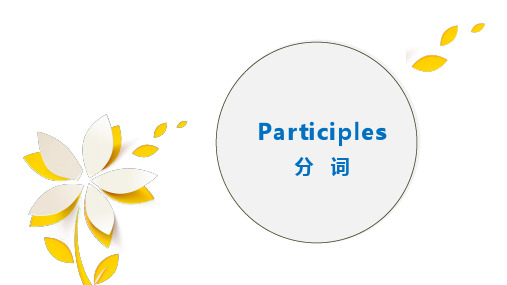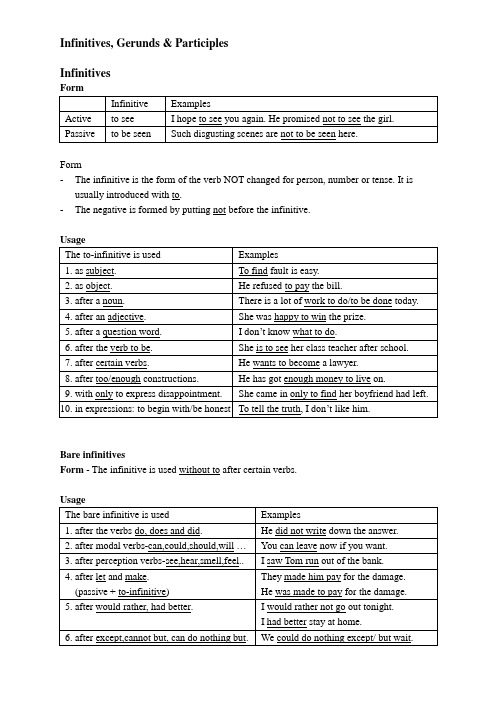participles
- 格式:ppt
- 大小:644.00 KB
- 文档页数:23





Infinitives, Gerunds & ParticiplesInfinitivesForm-The infinitive is the form of the verb NOT changed for person, number or tense. It is usually introduced with to.-The negative is formed by putting not before the infinitive.Bare infinitivesForm - The infinitive is used without to after certain verbs.GerundsForm-The gerund is a verb ending in - ing. It acts as a noun. -The negative is formed by adding not before the gerund.Verb + to-infinitive or –ing?Usage2. Either the to-infinitive or gerund can be used after certain verbs with no difference in3. Verbs taking to-infinitives or gerunds have a change in meaning.Note1.I saw Ken swim. It spent him an hour. (I saw the whole action from beginning to end.)I saw Ken swimming. ( I saw part of the action. I didn’t wait until he had finished.)2.The teacher doesn’t allow us to eat in class. (object + to-infinitive)We are not allowed to eat in class. (passive form + to-infinitive)The teacher doesn’t allow eating in class. (verb + gerund)ParticiplesSentence Transformation1a. Driving fast is dangerous.b. It is dangerous to drive fast.2a. I prefer driving to flying.b.I prefer to drive rather (than) fly.3a. They made him admit his guilt.b. He was made to admit his guilt.4a. They let him enter the building.b.They allowed him to enter the building.5a. She was too inexperienced to get the job.b.She wasn’t experienced enough to get the job.6a. We were interested in the lecture.b.The lecture was interesting to us.7a. Could you clean up the room?b.Do/Would you mind cleaning up the room?c.Would you be so kind as to clean up the room?8a. It was difficult for him to do the crossword.b.He had difficulty (in) doing the crossword.c.He found it difficult to do the crossword.d.He could hardly do the crossword.9a. It took her an hour to prepare the meal.b.She took an hour to prepare the meal.c.Preparing the meal took her an hour.d.She spent an hour preparing the meal.Find out the bare infinitive (B), the infinitive (I), the gerund (G), the present participle (Pr.p), or the past participle (P.p.) in each sentence. Underline and identify them.e.g. My mother let me go to the party. ( B )1. Penny wants to learn Japanese. ( )2. Do you enjoy going to the beach in the summer? ( )3. The doctor is saving the injured baby. ( )4. My aunt went shopping with me yesterday. ( )5. I am really frightened by you! ( )6. Would you go with me? ( )7. The talk was boring. ( )8. You should listen to me! ( )9. He is too young to understand the situation. ( )10. The finished product is a piece of artwork! ( )Exercise BChoose the correct option in each sentence.e.g. My boss expects me to work overtime. (work, to work, working, worked)1. I must ____________ more to keep fit. (exercise, to exercise, exercising, exercised)2. I remember ____________ Sue last Sunday. (visit, to visit, visiting, visited)3. The salesman seemed _____________ impatient. (get, to get, getting, got)4. I really miss ____________ in the countryside. (live, to live, living, lived)5. She was ____________ by the exhibition.(fascinate, to fascinate, fascinating, fascinated)6. If you don’t stop ___________, you’ll kill yourself. (diet, to diet, dieting , dieted)7. The boy ____________ a red T-shirt is my neighbour. (wear, to wear, wearing, worn)8. The cup ____________ with orange juice is yours. (fill, to fill, filling, filled)9. She is incapable of _____________ good decisions. (make, to make, making, made)10. I can’t wait ____________ her again. (see, to see, seeing, seen)Exercise CFill in the blanks with the correct form of verbs given.e.g. I was afraid of hurting his feelings. (hurt)1. After dinner, she continued ____________ her homework until late at night. (do)2. Tom stopped ____________ up his washing on the way home. (pick)3. Tell me your plan. I’m interested ____________ about it. (hear)4. The ____________ drama has won several awards. (amaze)5. Most of Hong Kong people don’t like _____________ meat. (freeze)6. I think you should give up __________ because you have a very poor voice. (sing)7. He isn’t strong enough ____________ in the basketball team. (be)8. ____________ is good exercise. (walk)9. It is getting dark. We had better ____________ now. (go)10. It is very cold. I would rather ____________ at home. (stay)There is one mistake in each sentence. Underline the mistakes and correct them.‘X’: extra word; ‘^’: missing word; ____: wrong worde.g. The girl is too young enough( X ) to look after herself. ( X )The girl is ( ^ too) young to look after herself. ( ^ )The girl is too young looking (to look) after herself. ( __ )1. I dislike to argue. ( __ )2. You ought finish the project now. ( ^ )3. I suggested to take a walk in the garden. ( __ )4. The teacher made Rose to do homework again. ( X )5. Paul did not object to join the party. ( __ )6. The broken chair needs be repaired. ( ^ )7. It is no use to asking Mike for help. He is selfish. ( X )8. You are not old enough join the club. ( ^ )9. They didn’t see her to come in. ( X )10. Depressing after losing all his money in gambling, George decided to start a new life. ( __ )Exercise ERewrite the following sentences using the words given, without changing the meaning.e.g. We were shocked by the news. (shocking)The news was shocking to us.1. Dad didn’t allow Jimmy to drive his car. (let)_________________________________________________________________________ 2. Would you be so kind as to move over a little? (mind)_________________________________________________________________________ 3. We found the horror film terrifying. (terrified)_________________________________________________________________________ 4. It was difficult for her to cope with city life. (difficulty)_________________________________________________________________________ 5. He wasn’t tall enough to be a policeman. (short)_________________________________________________________________________ 6. Mom advised us to catch the early train. (suggested)_________________________________________________________________________ 7. We should not make friends with triad members. (avoid)_________________________________________________________________________ 8. It is my pleasure to meet you. (meeting)_________________________________________________________________________ 9. They ordered him to clean the bathroom. (made)_________________________________________________________________________ 10. It took me several days to do the task. (spent)_________________________________________________________________________Suggested AnswersExercise E1. Dad didn’t let Jimmy drive his car.2. Would you mind moving over a little?3. We were terrified by the horror film.4. She had difficulty coping with city life.5. He was too short to be a policeman.6. Mom suggested us catching the early train.7. We should avoid making friends with triad members.8. Meeting you is my pleasure.9. They made him clean the bathroom.10. I spent several days doing the task.。

什么是非谓语动词?非谓语动词(Non-finite Verbs)是指不具有人称和时态变化的动词形式。
它们不能独立地充当句子的谓语,但可以在句子中作为名词、形容词或副词的补语、定语或状语。
在英语中,非谓语动词有三种形式:动词不定式(Infinitives)、动名词(Gerunds)和现在分词(Present Participles)。
1. 动词不定式(Infinitives):动词不定式由动词原形前加上"to"构成(例如:to go,to eat,to sleep)。
动词不定式可以用作名词、形容词和副词的补语。
-作名词:I like to swim.(作宾语)-作形容词:This is a good book to read.(修饰名词)-作副词:He runs to keep fit.(修饰动词)2. 动名词(Gerunds):动名词是动词的现在分词形式(动词原形+ ing),它可以作为名词的主语、宾语、补语或介词的宾语。
-作主语:Swimming is my favorite sport.-作宾语:I enjoy reading books.-作补语:Her hobby is dancing.-作介词的宾语:He is good at playing the guitar.3. 现在分词(Present Participles):现在分词是动词的现在分词形式(动词原形+ ing),它可以作为形容词或副词的修饰语。
-作形容词:The running water is refreshing.-作副词:She looked at me, smiling.非谓语动词的使用可以丰富句子结构,使其更加清晰和精确。
它们可以用来表达目的、原因、结果、条件等语义关系。
此外,非谓语动词还可以用来简化句子结构,使文章更流畅和紧凑。
在学习和运用非谓语动词时,我们需要注意它们的用法和搭配,并根据上下文准确选择合适的形式。
英语中的分词在英语中,分词(Participles)是一种动词的非限定形式,通常以-ing(现在分词)或-ed、-en、-t、-n(过去分词)结尾。
分词可以用作形容词,也可以用在一些复杂的动词时态中。
以下是关于分词的主要用法:●现在分词(Present Participle):1.以-ing结尾,如"playing," "reading," "walking"。
2.作为形容词使用,描述正在进行的动作或事物的特征。
例句:The playing children seemed happy.翻译:玩耍的孩子们似乎很开心。
3.用于进行时态(Present Continuous Tense)。
例句:She is reading a book.翻译:她正在读一本书。
●过去分词(Past Participle):1.过去分词的形式有多种,通常以-ed结尾,如"played," "talked";也可以是不规则的形式,如"broken," "written"。
2.作为形容词使用,描述已完成的动作或事物的状态。
例句:The broken window needs to be fixed.翻译:需要修理的破窗户。
3.用于完成时态(Present Perfect Tense, Past Perfect Tense)。
例句:They have eaten lunch already.翻译:他们已经吃过午餐了。
4.用于被动语态。
例句:The letter was written by Tom.翻译:这封信是汤姆写的。
分词在英语中也有其他一些用法,如独立分词、分词短语等。
分词的灵活运用可以使语言更富有表现力和变化。
Unit 2.Participles/voice分词/语态A.participles1.Present Participles1)构成进行时❶The world is trying to stop global warming.❷Violence on television is increasing juvenile ['dʒʊvənɪl]delinquency.分词就是具有动词及形容词二者特征的词注意:动名词和现在分词虽然形式一样,但从本身词性来说,动名词顾名思义,属名词词性,所以在句中要充当名词能作的成分,常作主语/宾语/定语/表语.现在分词(表主动/进行),属形容词词性,充当形容词能作的成分,常作表语/定语/状语/补语.所以可以从-ing形式作的成分来确定它是动名词还是现在分词.如果-ing形式是作主语/宾语的,那肯定就是动名词了.如果是作状语/补语,那肯定是现在分词.至于动名词和现在分词都可以作的成分定语/表语,需要具体去区别.作定语时的区别:现在分词表示主动/进行,作定语时表示与被修饰词是主动关系.动名词作定语时表示被修饰词的用途.2)做形容词时表主动含义❶We should protect every living creature.❷Not all television programs are interesting.2.Past Participles1)构成完成时❶We have experienced a great deal of stress in our daily lives.❷Before the airplane was invented, people had thought that only birds could fly.2)作形容词时表被动含义❶Highly educated people may get better jobs than others.❷Some parents are never satisfied with their children’s grades.(被满足)总结:现在分词表示“主动和进行”,过去分词表示“被动和完成”3.Participle Clauses1)种类分词短语作状语表示时间、原因、条件、让步和伴随状态。